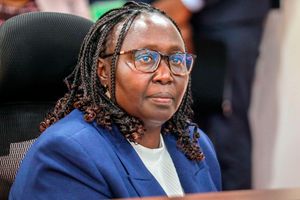
National Treasury Cabinet Secretary John Mbadi.
Treasury Cabinet Secretary, John Mbadi, faces an unprecedented challenge as he prepares to deliver his first budget in a debt-strained economy still reeling from last year’s anti-Finance Bill protests.
In a fortnight, Mr Mbadi will step into Parliament to deliver a budget that could define Kenya’s economic trajectory—and his own political future. It will either make him President William Ruto’s Mr Fix it or break him.
His task is complicated by political tensions, economic pressures, and the legacy of his predecessor, Njuguna Ndung’u, whose tax policies triggered widespread unrest.
The Law Society of Kenya (LSK) and the Institute of Certified Public Accountants of Kenya (ICPAK) have called for transparent budget-making, emphasising austerity measures and efficient spending over new taxes. The stakes could not be higher.
Appointed on August 8, 2024, Mr Mbadi, a certified public accountant and veteran Orange Democratic Movement (ODM) politician, must deliver his first budget on June 12, 2025, in a nation burdened by a Sh11.02 trillion public debt, escalating living costs, and lingering trauma from the 2024 Finance Bill protests. He admits being under pressure to deliver.
“There is pressure yes but it’s not undue. When taking up some of these positions in government, being responsible for the finances of the nation for that matter, you must be prepared for pressure and I must say I’m sufficiently prepared for it. The scrutiny is massive; we expected it because the last one was rejected,” he told the Daily Nation on Wednesday.
The CS said that people should understand that the budget making process is not a one-man affair but a national agenda; it is a whole government approach and that’s why it started last year.
He said the national purse cannot cater for every demand made on it by the public, and as such prioritisation is key.
“You can’t get everything that you want. The focus for me is to get the economy back to its strong footing. That way, most of these pressures are sorted. Some of these demands are desirable, they are important; but we cannot afford to finance them now,” the CS said.
“I must also bring it to the attention of the nation that we don’t work in isolation, things are tougher on a global scale and increasing taxes is not the solution. We must realise some level of liquidity for economic growth to be achieved and you don’t do that by more or higher taxation.”
The anti-tax protests, which left over 50 dead, underscore the stakes. The minister must navigate a fractured ODM, an uneasy coalition with President Ruto’s Kenya Kwanza, and a citizenry battered by economic hardship.
With the budget due in a fortnight, Mbadi’s balancing act is a high-wire performance above a lion’s den.
Kenya’s economic landscape is grim. The public debt, at above Sh11.36 trillion exceeds 65 per cent of GDP, with debt servicing devouring nearly half of the Sh2.5 trillion annual revenues.
“We are collecting Sh2.5 trillion and we are spending on loan repayment about Sh1.1 trillion. So, where do you get money for development?” Mr Mbadi recently questioned.
National government salaries alone consume Sh960 billion annually, leaving little for infrastructure or social programmes.
The 2024 Finance Bill, which ignited nationwide protests led by Gen Z, remains a stark warning.
Its punitive tax measures, perceived as tone-deaf amid economic hardship, led to the storming of Parliament and Prof Ndung’u’s exit. He left alongside other Cabinet colleagues except Prime Cabinet Secretary Musalia Mudavadi.
Cs Mbadi’s approach to the 2025/26 budget starkly contrasts with his predecessor Prof Ndung’u’s top-down, tax-heavy 2024 Finance Bill.
While Prof Ndung’u’s opaque process ignored public sentiment, Mr Mbadi is walking a high wire of inclusivity, launching a nationwide call for “budget tips” in January 2025, per Section 35 of the Public Finance Management Act, and pledging no new taxes.
Aware of the possible backlash, the minister has been on an overdrive to explain the process to the masses.
“I’m directly responsible for communicating what the ministry is doing in terms of fiscal policy. I want people to be informed of what we do, especially the young people, the Gen Z. I’m not saying we’re perfect but ours is to ensure there are no punitive provisions in this budget. It is a progressive bill,” he said.
His zero-based budgeting, proposed VAT and corporate tax cuts, and transparency on the Sh11.02 trillion debt—“Kenyans deserve to know who they owe,” he said on March 18, 2025—aim to balance fiscal discipline with public trust, a delicate act to avoid Ndung’u’s fate and keep Kenyans off the streets.
Mr Mbadi has vowed to avoid his predecessor’s missteps. “The Finance Bill 2025 has taken a different path to ensure we don’t burden Kenyans further while addressing fiscal challenges,” he told the Nation on May 16, 2025, during a public participation forum. His strategy hinges on aligning the budget with Kenya’s Medium-Term Debt Strategy and National Tax Policy, emphasizing “stability, predictability, and sustainable fiscal management.”
To rebuild trust, Mr Mbadi launched a public consultation drive in January 2025, inviting Kenyans to submit “budget tips or suggestions” for the 2025/26 financial year.
“Section 35 of the Public Finance Management Act, 2012 mandates us to seek public views in preparing the Budget Policy Statement,” he said on NTV’s The Brief on January 15, 2025, urging submissions on economic recovery, cost-of-living relief, hunger eradication, job creation, and tax base expansion. This move, analysts note, aimed to prevent a repeat of 2024’s unrest.
Economic commentator David Ndii, also the chairman of the team advising the president on matters economy, posted on X on May 20, 2025, that “Mbadi’s public engagement is a smart move, but the proof will be in the budget’s execution. Kenyans won’t forgive another tone-deaf fiscal plan.”
Mr Mbadi’s role in Ruto’s “broad-based government”, formed post-2024 protests to stabilise the administration, has split ODM down the middle.
Party Secretary-General Edwin Sifuna (Nairobi Senator) criticised the coalition’s performance, slamming “unending State blunders” at a Siaya County funeral on April 12, 2025, as reported by the Nation.
Mr Sifuna’s frustration, shared by ODM figures including Kisumu Governor Anyang’ Nyong’o, centres on issues such as delayed county funds and abductions. It highlights the unease with ODM’s cabinet presence, including Mbadi, Energy CS Opiyo Wandayi, Mining CS Hassan Joho, and Cooperatives CS Wycliffe Oparanya.
Tensions boiled over at the May 2025 burial of MP Ong’ondo Were, where Mbadi clashed with Mr Sifuna. According to the Nation on May 10, 2025, Mr Mbadi defended his role and told mourners, “I’m working to reform this economy to show that if Raila Odinga became president, this is what ODM would deliver.” The exchange, ending in a handshake, underscored ODM’s internal rift.
Mr Odinga, ODM’s leader, has endorsed Mr Mbadi unequivocally. At ICPAK’s 42nd Annual Seminar in Mombasa on May 20, 2025, Mr Odinga predicted transformative reforms in CS Mbadi’s budget. “Give John Mbadi time, and you’ll see what ODM can do when he presents his budget next month,” the former prime minister said, highlighting plans to convert the Housing Levy into an investment scheme with refundable contributions. Mr Odinga’s support positions Mbadi’s tenure as a showcase for ODM’s 2027 ambitions.
The Kenya Kwanza-ODM coalition, forged to quell 2024’s unrest, is fraught with tension.
Senator Sifuna’s April 2025 jab at Ruto—“Your people in government commit blunders daily”—cited incidents such as the teargassing of Nakuru schoolchildren.
Mr Mbadi has defended his role in the budget process, arguing it demonstrates ODM’s competence. “We are in these positions because we are capable.”
Migori Governor Ochilo Ayacko echoed this, telling the Nation that Raila’s pact with Ruto was for “inclusivity and service.” Yet, Kenya Kwanza allies accuse ODM of political grandstanding, citing disputes over the Road Maintenance Levy Fund.
Mbadi’s budget faces scrutiny from key institutions. The LSK, in a March 2025 submission demanded transparency in debt management, aligning with Mbadi’s own stance: “Kenyans deserve to know who they owe, how much, and the interest rates,” he told the Senate Budget Committee on March 18, 2025, according to the Nation. His Medium-Term Debt Strategy aims to cut the debt-to-GDP ratio to 52.8 per cent by 2027/28.
ICPAK Chairman Philip Kakai, speaking at the launch of ICPAK’s 2025-2029 Strategic Plan on October 16, 2024, highlighted the Sh11.36 trillion debt’s strain.
“Inflation is pushing basic goods out of reach, and youth unemployment at 35 per cent is a ticking time bomb,” he said.
Mr Mbadi, a registered CPA, praised ICPAK’s alignment with the Treasury’s 2023-2027 blueprint, saying, “Accountants are the gatekeepers of financial integrity,” per NTV on October 17, 2024.
The Institute of Economic Affairs (IEA), in its 2025 Budget Policy Statement submission, criticised reliance on tax hikes, urging expenditure reforms.
Kirinyaga County Woman Representative Njeri Maina voiced public frustration: “Taxpayers see no return on borrowed funds. Public participation feels like a PR stunt.”
Analyst Aly-Khan Satchu, posting on X on May 22, 2025, warned, “Mbadi’s budget must deliver relief, not rhetoric, or he risks reigniting public anger.”
Mr Mbadi’s Sh4.3 trillion 2025/26 budget adopts zero-based budgeting to reorient spending.
“We won’t introduce new taxes but will expand the tax base through KRA’s digital efficiency,” he told the Business Daily on May 16, 2025.
He highlighted monetary gains, noting the Central Bank Rate’s drop from 13 per cent in August 2024 to 10.75 per cent in February 2025, and inflation’s fall from 9.6 per cent in October 2022 to 3.3 per cent in January 2025.
Proposed tax reforms include cutting VAT from 16 per cent to 14 per cent and corporate tax from 30 per cent to 25 per cent, alongside reinstating select 2024 Finance Bill provisions, like moving items to exempt schedules to curb fictitious VAT refunds.
On job concerns, Mr Mbadi assured NTV’s Youth Forum on May 23, 2025, that, “The Finance Bill 2025 will create jobs, not cut them. Parastatal staff from mergers will be reassigned.”
His two-year economic recovery plan, outlined in Kisumu in August 2024, aims for tangible results by 2026. “Our economy is struggling because we took short-term loans for long-term projects,” he told the Senate on March 18, 2025, expressing optimism.
“The budget we’ve prepared is one of Kenya’s best,” he insists, a claim June 12 will scrutinise.
Critics like Uriri MP Mark Nyamita question zero-based budgeting’s feasibility amid debt pressures. Yet, Mr Mbadi soldiers on, bolstered by his CPA credentials and parliamentary experience. “Someone has to do the job,” he might say, echoing his resolve.
Whether he can tame the economic and political beasts—proving ODM’s mettle and restoring public trust—will shape his legacy and Kenya’s future.







